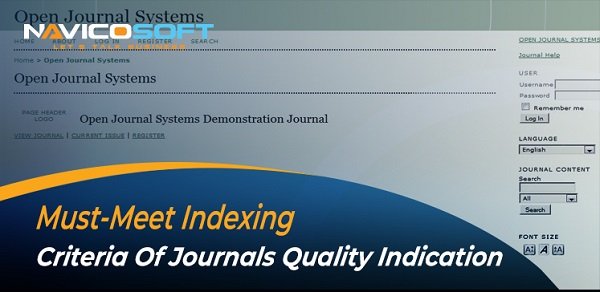Online journal publishing has been on the rise in recent years. With digital media and the World Wide Web’s rapid and continuous access, it has become easier for students, researchers, and institutions to publish their articles and journals without waiting long times. However, indexing is one of the bare essentials to streamline this publishing. That being said, there are also the indexing criteria of journals that they must fulfill, which has been discussed here.

First, have a look at:
What is the indexing of a Journal?
You are already familiar with what the word ‘index’ means; a listing of the items for a purpose. As for journals, indexing refers to organizing the journals in a list corresponding to discipline, subject, or type of publication in the database. There are two types of indexing, namely, general indexes and specialized indexes.
For the most part, it is to reflect the higher scientific quality of an Open Journal Systems Hosting. It not only engenders reputation but also streamlines the accessibility of a journal for the users. That means they can easily find it.
Indexing is one of the attributes that authors look for when deciding to choose a journal for publishing. So a journal with heaps of abstracting and indexing services is their first priority as compared to non-indexed journals. Thus, in order to be credible among the journals and article publishers, a journal needs indexing.
Indexing criteria of Journals
There are some publishing standards that a journal must meet to be indexed in a database. Below is a brief explanation of them.
International Standard Serial Number (ISSN)
The first criterion is the ISSN number, which is an eight-digit serial number. It is specifically used for the identification of serial publications (with either one or both print and electronic publications). Be it a journal, magazine, and so forth with the same title. ISSN number readily helps identify, for instance, a serial and recurring publication like a periodic journal (with monthly publications).
Digital Object Identifiers (DOIs) for all Articles
The DOI number, as suggested by the name, is Digital Object Identifier. It is a number (unique) assigned to articles, papers, files, etc., to identify them uniquely. Typically, publishers give that DOI after the article publishes electronically to classify a particular publication. Thus, you will mostly find it on the first page and in an article’s header or footer information.
P.S. You might be wondering ISSN and DOI numbers both are identifiers, so what’s the difference between them. Remember, ISSN is to identify a complete bracket of information, like a journal or magazine (the book isn’t included). At the same time, DOI is to identify separate articles, abstract papers, or digital entities.
Publishing Schedule
The next is the timeline of a journal to control the publication; how often a journal will publish. For example, some journals have monthly issue publishing frequency others have a quarterly cycle.
Established Copyright Policy
Indexing also needs a journal’s copyright policy that should be constructively established. In simple words, Copyright policies contain the are legal information (documents) to describe the rights of using and distributing the original work (content). Authors also prefer to know the Copyright Policy before sending their articles to a journal for publication.
Basic article-level metadata
It goes without saying Web browsers, and scholarly indexes have to display and serve the articles in search results. So, article-level metadata is the precise yet descriptive information of the articles, for instance, open abstracts. It effectively helps digital web browsers and scholarly indexes to ingest and interpret information about the article’s content (s). So for indexing, it is one of the most important indexing criteria of journals.
The above ones are the indispensable indexing criteria of journals. However, the requirements can vary depending on the database you want your journal indexed to. For instance, some can be (but are not limited to):
- Editorial Board Information
- Peer Review Policy
This is all for the indexing criteria of journals. Remember to keep it in mind while setting up your online journal. By signing up for OJS Hosting, you get a fully-developed setup ready to host your journals and scholarly articles. In addition, OJS is optimized for easy content discovery across search engines such as Google, Google Scholar, etc., and is famous for the comprehensive indexing of journals. Navicosoft provides Open Journal System Hosting for all-scale publishing. Depending on your needs, you can choose from the Gold, Platinum, and Diamond packages.